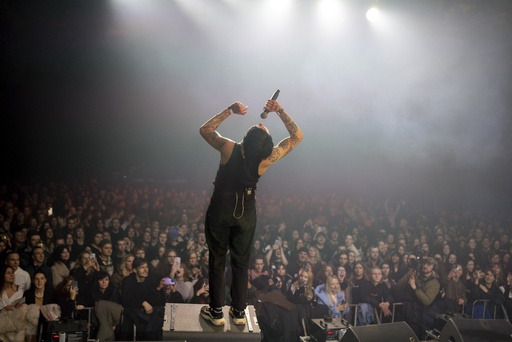
KYIV, Ukraine — A concert was held in a historic film studio in Kyiv, with the location kept confidential until the last minute to avoid potential Russian strikes. Over 1,000 soldiers and young attendees gathered for this unique event, which aimed to support Ukrainian troops through fundraising efforts.
This occasion marked the inaugural live performance for the charity album “Epoch,” a project that unites the 3rd Assault Brigade with eight popular Ukrainian bands. The ambitious goal of the initiative is to raise 50 million hryvnias (about $1.2 million) to acquire an M113 armored personnel carrier, designed to transport infantry to the front line and facilitate the evacuation of the injured for medical care. Since its launch on streaming platforms a month ago, the campaign has garnered about 9 million hryvnias (around $214,000).
Fundraising efforts aimed at supporting Ukrainian fighters began as early as 2014 when Russia annexed Crimea and pro-Moscow separatists instigated unrest in eastern Ukraine. At that time, Ukraine’s military comprised a conventional army bolstered by volunteer groups that operated largely without financial aid from the government, relying heavily on self-funding. Today, advertisements lining sidewalks in Kyiv request public donations to bridge financial gaps in military resources. Citizens can simply scan a QR code to contribute towards necessities such as body warmers, drones, and armored vehicles for soldiers stationed along the nearly 1,000-kilometer (620-mile) front line.
However, reports indicate a decline in individual donations for some organizations, largely attributed to the difficult economic climate. Oleksandr Borodyn, one of the organizers for the concert, explained that the initiative evolved from the growing challenge of funding military needs as the conflict approaches its three-year anniversary.
“To raise the same amount of money as at the beginning of the war, you need much more effort,” Borodyn remarked. He emphasized the power of musicians donating their artistry to generate funds for the troops as a significant and timely idea.
This fundraising effort coincides with U.S. President Joe Biden’s push to expedite additional military aid before the future of U.S. support for Kyiv could potentially shift with the arrival of a new administration under Donald Trump. Monobank, a leading donation processing platform, reported that throughout the initial 1,000 days of the war, approximately 10.5 million unique users contributed a total of around 77 billion hryvnias (approximately $1.8 billion) to various charitable organizations.
Yet, some charity efforts, like the Come Back Alive foundation, which provides support through military training and procuring drones, have seen a marked decrease in donations compared to the earlier stages of the conflict. In the first year alone, the foundation amassed over 5.7 billion hryvnias ($184 million); however, as 2024 approaches, it has only reached roughly 3.6 billion hryvnias ($89 million).
“Many people report a worsening financial situation, which limits their ability to contribute to supporting the military,” noted Oleh Karpenko, the foundation’s deputy director.
The ongoing war has significantly impacted Ukraine’s economy, with a World Bank report from May revealing an increase of 1.8 million people living in poverty since 2020, amounting to about 9 million, or 29% of the population. To assist the most disadvantaged citizens, the government initiated a winter support program in early December, resulting in around 6.5 million applications for a one-time payment of 1,000 hryvnias ($24) to help with utilities, healthcare, and communication costs.
Karpenko also highlighted that local initiatives and smaller fundraising drives enable many to focus their donations on specific soldiers or units they have personal connections with, which may detract from the larger organizations that traditionally provided urgent battlefield support that the government struggles to fulfill.
“International support also plays a significant role in donation levels,” Karpenko stated, adding that fluctuations in aid from global partners can greatly affect Ukrainian morale. “When international assistance declines, it can lead to diminished motivation within society to contribute, especially when the flow of weapons appears inconsistent.”
Amidst the concert’s atmosphere, 26-year-old Oksana Kalenchenko pointed out the importance of events like this in sustaining public support. “It’s a reminder that there is a war going on in Ukraine; let’s keep donating, let’s keep doing everything we can,” Kalenchenko expressed.
The collaborative album showcases the talents of emerging Ukrainian artists from genres such as rock, rap, and alternative music, with many songs reflecting the harrowing experiences of living amid ongoing conflict. Borodyn underscored the mission of the project: “We want to convey how contemporary artists respond to the realities of war in Ukraine… That’s why it’s called ‘Epoch’—it signifies the era we are living in.”
Since the onset of the full-scale invasion on February 24, 2022, Ukrainian music has experienced a renaissance, with many artists moving away from the historically dominant Russian pop scene. “Previously, Ukrainian music didn’t receive the attention it merits,” noted Iryna Panchuk, a singer-songwriter with the band “Renie Cares.” “This separation is crucial because it distinctly differentiates us from Russia, and this differentiation must be emphasized,” she added.
